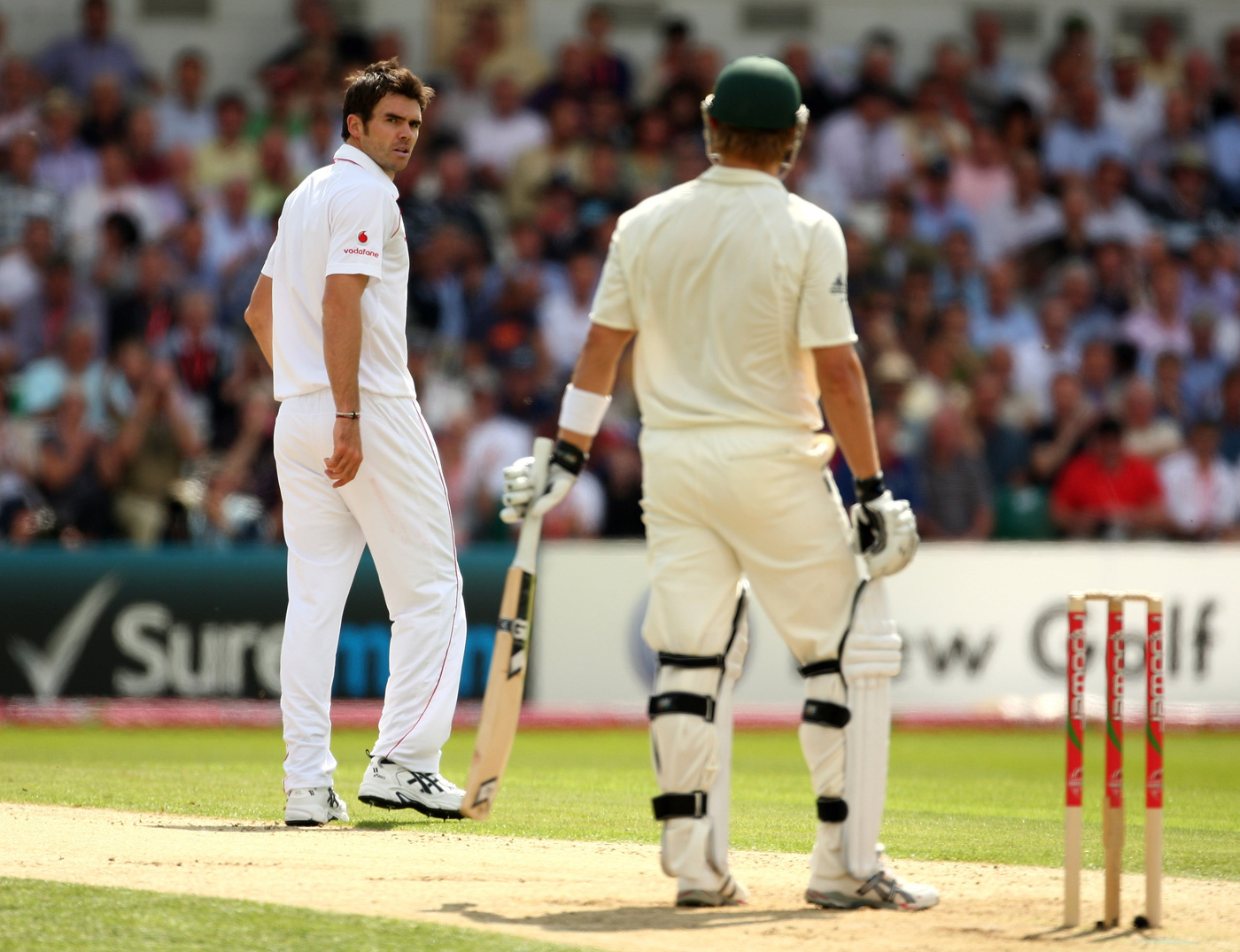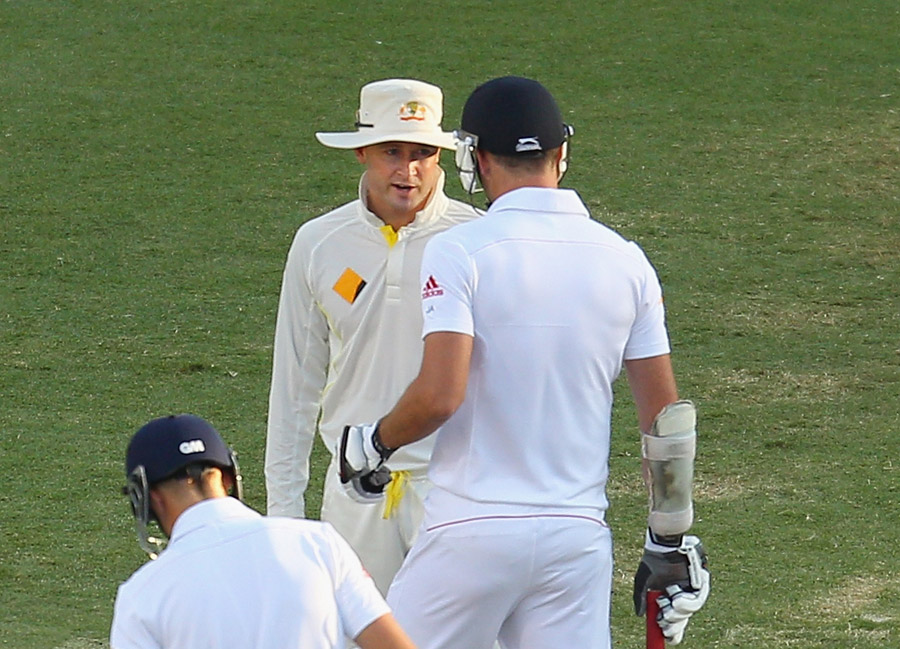"You might be a lone voice but keep at it and especially at youngsters. Tell them that sledging does not make them better cricketers, and definitely not better men."
My recent piece, trying to understand the tenuous link between sledging and manhood, between trash talk and improved performance, attracted lots of feedback, much of it offline, to my own website or private email. The encouraging message above came from one of cricket's true greats, someone who would probably feature in an all-time World XI. He played (and tamed) the very best cricketers of his era, so his comments carry some weight because they come from someone who succeeded at the highest level.
Jimmy Anderson attributes some of his bowling skill to also being a skilled sledger, although I'm not convinced he understands that merely doing something regularly, no matter how tasteless, equates to necessarily being proficient at this dubious dark art.
What intrigues me about this debate is the complete unwillingness of anyone to admit that sledging affects them adversely. It flies against machismo to admit that it actually gets to you, but the same held true about admitting to depression; fortunately we have now moved beyond that immaturity and many are willing to confront this issue with courage, by speaking out. No one in the England camp has dared to concede that sledging gets under their skin, but curiously they have asked the Australians to refrain from making comments about Jonathan Trott. Why? If sledging is irrelevant and doesn't penetrate your veneer, what does it matter what they say about Trott, your wife, your mum or whatever? It doesn't affect you, remember? And Trotty's not even there to hear it, and even if he was, it didn't affect him either (apparently).
The Australians have long held this view, but nonetheless they took deep offence when Andrew Symonds was allegedly called a monkey. Not just Symonds but even the other so-called "hard men" got involved, though they regularly engaged in "banter" that might have caused equal hurt to other professional colleagues. How can you have your cake and eat it too? If on-field sledging doesn't hurt anyone, what does it really matter what is said? Or are they now admitting that it does actually cut to the bone but no one's actually going to be man enough admit it?
Of course words hurt. We wouldn't be human if they didn't. In the violence-prevention work I do, it is a clearly established truth that there is a clear continuum from verbal to physical violence. The Test cricketer quoted above thinks it is a matter of time before we'll have a physical confrontation on the field, unless we just revert to playing the ball and not the man. See Warne v Samuels or Styris v Johnson as recent examples of those lines almost being crossed. So at the risk of being vilified, I'll prosecute this side of the debate and wait for the vitriol that will inevitably follow.
Just this week in Australian sport, we have a case of a star AFL player who is alleged to have broken a team-mate's jaw outside an LA nightclub, an incident that began with insults being thrown. So there's the first bit of evidence linking the continuum from verbal to physical. These men are accustomed to sledging (and being sledged) on the field but they can't cop it off the field? Another man died on the Sunshine Coast, after being bashed outside a nightclub a few days ago, an incident triggered by verbal violence that spilled over into the physical realm. I could go on but the evidence is so overwhelming that it is hardly necessary.
Sunday's Australian Open golf was a magnificent sporting spectacle. Neither Adam Scott or Rory McIlroy needed to abuse each other to prove their manhood
Those who argue that the sporting field is a special place, immune from the normal rules, risk blurring the reality. Some of the rubbish that is spoken on the field, if repeated on the streets, especially when combined with alcohol and male bravado, can lead to tragic consequences if one of the parties doesn't quite buy into the axiom that what happens on the field stays on the field. Look at the case of David Hookes - on the field, the sort of language he allegedly used was deemed acceptable, but outside a restaurant late at night, angry words can precipitate an unnecessary tragedy. Even sportsmen sometimes forget that they have crossed the white line.
Another great irony, pointed out by an ESPNcricinfo reader, was that both Mitchell Johnson and David Warner were sporting moustaches as part of the Movember charity, aimed at shining a torch on the dark corners of men's health issues (including depression) when Warner, especially, targeted Trott's precarious situation. Warner will argue (truthfully) that he was unaware of Trott's personal demons, but isn't that the point? Depression is a disease that is often hidden and masked; men, especially, have difficulty owning up to it until someone or something pushes one button too many. There is more to being a real man than being able to grow a moustache for charity.
The notion that sledging is okay so long as players know not to cross the line is ludicrous. What is that line, who agreed to it, does it change from day to day and from person to person? I've been racially insulted on the cricket field hundreds of times but that line of abuse just washes over me (when you've got a face like mine, anything that draws attention away from that is a bonus!). It clearly got under Symonds' nose, though, despite him not being averse to dishing it out himself. Each day is different, things change depending on form, personal circumstances and the dark demons that haunt men in their private moments. Will the ICC now get captains to exchange a list of acceptable sledging topics when they exchange team lists at the toss? "Don't mention XYZ's wife this week because she is ill, but his daughter is fine so that's okay. Check again tomorrow for a family health update."
We've already seen how one of the worst serial sledgers of our time, Glenn McGrath, reacted when Ramnaresh Sarwan mentioned McGrath's sick wife (who Sarwan most likely didn't know was sick) in response to some ugly words from McGrath. So the very people who sledge mercilessly and reckon they can cop it have soft underbellies too? Who gets to choose what topics are off limits? Why not just play cricket as best you can and forget all the trash-talking?
It's not enough to say that men need this artificial fillip to fire themselves up for heightened performance. There's no suggestion that Rafael Nadal or Roger Federer deal in this currency, yet they are playing for high stakes too, at the pinnacle of their sport. Sunday's Australian Open golf was a magnificent sporting spectacle; neither Adam Scott or Rory McIlroy needed to abuse each other to prove their manhood. Both athletes displayed a grace and dignity that in no way detracted from their manhood, yet they were locked in combat for 18 holes, playing shot for shot.
So why do some cricketers (and fans) still think that our great sport needs this? By all means bowl fast, bowl short, glare at the batsmen if you need to, but ask yourself honestly if this actually has any effect. It seems that no one admits to being affected by it but we're all swearing by it (literally) anyway. And then someone crosses that invisible line and all hell breaks loose and we act surprised, as if we didn't see this train smash coming. Cricket deserves more from us but I sometimes wonder if we deserve cricket.



